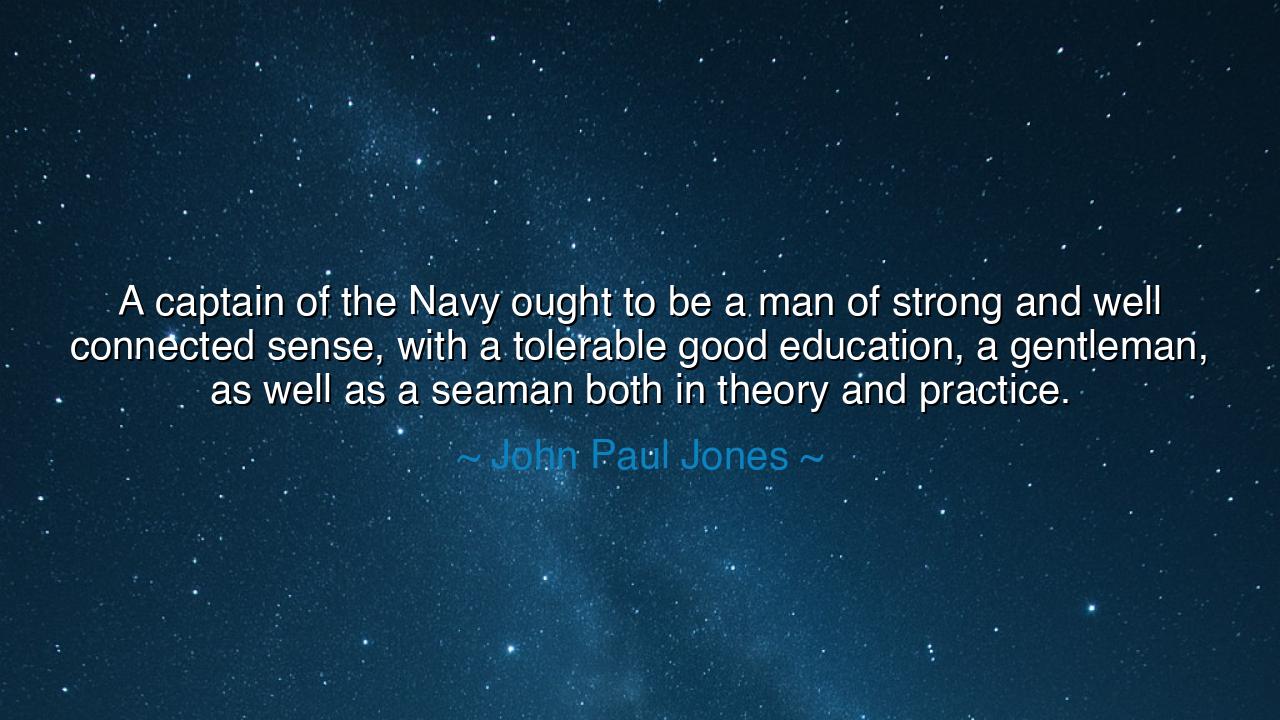
A captain of the Navy ought to be a man of strong and well
A captain of the Navy ought to be a man of strong and well connected sense, with a tolerable good education, a gentleman, as well as a seaman both in theory and practice.






In the stirring words of John Paul Jones, father of the American Navy, “A captain of the Navy ought to be a man of strong and well-connected sense, with a tolerable good education, a gentleman, as well as a seaman both in theory and practice.” These words rise like a tide of wisdom from the deep — not merely a command for sailors, but a reflection upon leadership, discipline, and character. Jones spoke them not in comfort, but in the tempest of history, when nations were young and freedom was fragile. In his vision of a captain, we see the ancient ideal of the noble leader — one whose strength is tempered by intellect, and whose courage is guided by grace.
To understand the origin of this quote, one must look to the life of John Paul Jones himself — a man of humble birth, yet boundless ambition. Born in Scotland, he rose from obscurity to command ships under the flag of a fledgling America. He was a warrior of the seas, but also a man of learning, who studied navigation, mathematics, and philosophy. He believed that the sea demanded not only muscle and instinct, but mind and manners — that a true captain must marry knowledge with courage, reason with valor. His words, therefore, were not an abstraction; they were the creed by which he lived and led.
When he said a captain must have “strong and well-connected sense,” he meant that the leader’s mind must be both keen and balanced — able to weigh the chaos of the storm with the calm of reason. For the sea, like life, tests the steadiness of the soul. It grants no mercy to the rash, nor favor to the foolish. The captain, then, must be more than brave — he must be wise. He must see beyond the rolling waves to the purpose that lies beyond them. And such wisdom, Jones declared, is born of education — not merely the schooling of the mind, but the shaping of the character.
But he spoke, too, of being a gentleman, and here lies a truth as old as virtue itself. To Jones, a gentleman was not defined by wealth or rank, but by conduct — by dignity in command, by fairness in judgment, by respect for those who serve beneath him. The sea captain who ruled by fear was but a tyrant adrift; the one who led by honor and example commanded loyalty as steadfast as the stars. In this union of gentility and discipline, Jones saw the makings of greatness — for only when strength is softened by grace does it become leadership, and only when power is guided by virtue does it become noble.
In the annals of history, we find this ideal embodied again and again. Consider Horatio Nelson, the British admiral who faced the mighty fleets of Europe. He was fierce in battle, yet tender toward his men; bold in strategy, yet humble before fate. When his ship was struck and his life’s breath fading, his last words were not of conquest, but of duty — “Thank God I have done my duty.” In Nelson, as in Jones, we see the balance of theory and practice, the harmony of intellect and action. Such men remind us that mastery without morality is hollow, and courage without wisdom is perilous.
Thus, John Paul Jones spoke not merely to sailors, but to all who would lead — on the sea or in life. His message was that knowledge alone is not enough, nor is raw strength. The true leader must embody mind, heart, and honor in equal measure. He must study the craft of his calling, yet never forget the humanity of those who follow him. He must be both a scholar and a servant, both a commander and a companion. For leadership is not domination, but stewardship — not glory, but responsibility.
The lesson, dear listener, is timeless: whatever your station, seek to become not only skilled, but wise; not only strong, but gracious. Educate your mind, but refine your character. Strive for mastery in your work, but temper it with humility and respect. For the world, like the sea, will test your mettle — and only those who balance intellect with integrity, courage with compassion, can truly steer the ship of life through the storms of fate.
So let the words of John Paul Jones be your compass: be both gentleman and seaman, both thinker and doer, both master of your craft and servant of what is right. Then, when the winds rise and the waves roar, you will stand at the helm unshaken — not because fortune has favored you, but because discipline, honor, and wisdom have anchored your soul. For these are the true marks of a captain, and indeed, of a man.






AAdministratorAdministrator
Welcome, honored guests. Please leave a comment, we will respond soon